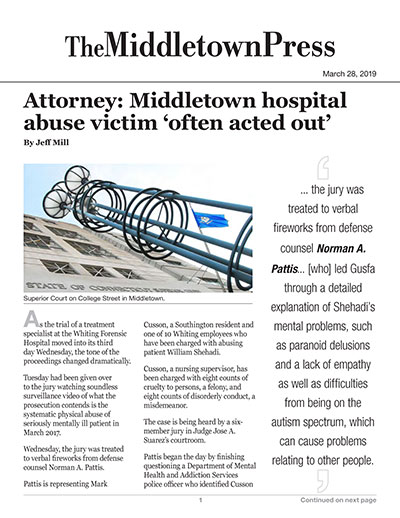As the trial of a treatment specialist at the Whiting Forensic Hospital moved into its third day Wednesday, the tone of the proceedings changed dramatically.
Tuesday had been given over to the jury watching soundless surveillance video of what the prosecution contends is the systematic physical abuse of seriously mentally ill patient in March 2017.
Wednesday, the jury was treated to verbal fireworks from defense counsel Norman A. Pattis.
Pattis is representing Mark Cusson, a Southington resident and one of 10 Whiting employees who have been charged with abusing patient William Shehadi.
Cusson, a nursing supervisor, has been charged with eight counts of cruelty to persons, a felony, and eight counts of disorderly conduct, a misdemeanor.
The case is being heard by a six-member jury in Judge Jose A. Suarez’s courtroom.
Pattis began the day by finishing questioning a Department of Mental Health and Addiction Services police officer who identified Cusson in several of the videos shown to the jury Tuesday.
The state, in the person of Assistant State’s Attorney Jeffrey Doskos, then presented a technician from the Office of the Chief State’s Attorney who had tweaked the photos to lighten them.
After minimal questioning by both sides, she was followed to the stand by Dr. James Gusfa, a psychiatrist who treated Shehadi from 2015-17.
Pattis led Gusfa through a detailed explanation of Shehadi’s mental problems, such as paranoid delusions and a lack of empathy as well as difficulties from being on the autism spectrum, which can cause problems relating to other people.
Shehadi has been hospitalized since 1995, when he killed his father but was found not guilty by reason of mental disease or defect.
His deficits result in Shehadi often acting out with violent mood swings and ritualized actions, as well as issues involving soiling himself — issues treatment specialists may not have been adequately trained to handle, Pattis said.
Pattis grew agitated by his inability to get Gusfa to answer “yes” or “no” to his questions. Instead, the doctor would attempt to explain his answers.
At one point Pattis said, “I’ll make you a deal: you can talk all you want if you just answer my questions.”
Out of the jury’s hearing, Pattis told Suarez that Gusfa “is continuing to avoid answering my questions.”
“I ask him direct questions and he’s fighting me. If he wants to fight me, I’ll fight him,” Pattis said, asking the judge to “put a leash on him.”
Pattis pressed the judge to give the doctor judicial notice in the presence of the jury. That, Suarez declined to do. However, he did admonish Gusfa, who apologized.
And for the next several minutes, he largely kept to simple yes or no answers.
Pattis asked Gusfa if Shehadi would erupt into foul language when he acted out. Gusfa said that would depend on what Pattis considered foul language.
Pattis said he was from Detroit, so he was used to foul language. Gusfa said he was also from Detroit and the two men agreed that Shehadi “has a mouth like sailor.”
Pattis also got Gusfa to admit that when he acted out, Shehadi would often resort to “hitting, kicking, biting and significant aggressions toward others.”
Pattis then pressed Gusfa to acknowledge that in some instances some form of restraint might be needed to control Shehadi.
The doctor’s response began to go beyond a simple answer, and Pattis quickly moved to stop him by calling out the word “Sir” three times, each time saying it with both more volume and passion.
The afternoon session ended in yet more conflict when Pattis sought to suggest Gusfa might be altering his answers because he feared Shehadi’s brother, Al, might sue the doctor. That brought an immediate and emphatic objection from Doskos, the prosecutor.
Suarez kept the two lawyers at bay as he hustled the jurors out of the courtroom. He then sought to defuse the situation.
The jury returned and Pattis was allowed to ask the question.
Gusfa said he was not worried about a potential suit nor was he tailoring his responses.
Suarez adjourned court for the day. The trial is scheduled to resume Thursday.
The alleged abuse happened when Whiting Foresic Hospital, then Whiting Forensic Institute, was part of Connecticut Valley Hospital. An executive order in 2018 separated Whiting Forensic from the hospital in order for the Department of Mental Health and Addiction Services “to focus more directly on the changes needed to continue to improve the quality of care at the facility,” then-Gov. Dannel P. Malloy said in a statement.

